2015年中考外研版英语一轮教材复习课件 七年级下册 Modules 5~8课件
文档属性
| 名称 | 2015年中考外研版英语一轮教材复习课件 七年级下册 Modules 5~8课件 |  | |
| 格式 | zip | ||
| 文件大小 | 3.2MB | ||
| 资源类型 | 教案 | ||
| 版本资源 | 外研版 | ||
| 科目 | 英语 | ||
| 更新时间 | 2015-04-19 21:32:21 | ||
图片预览

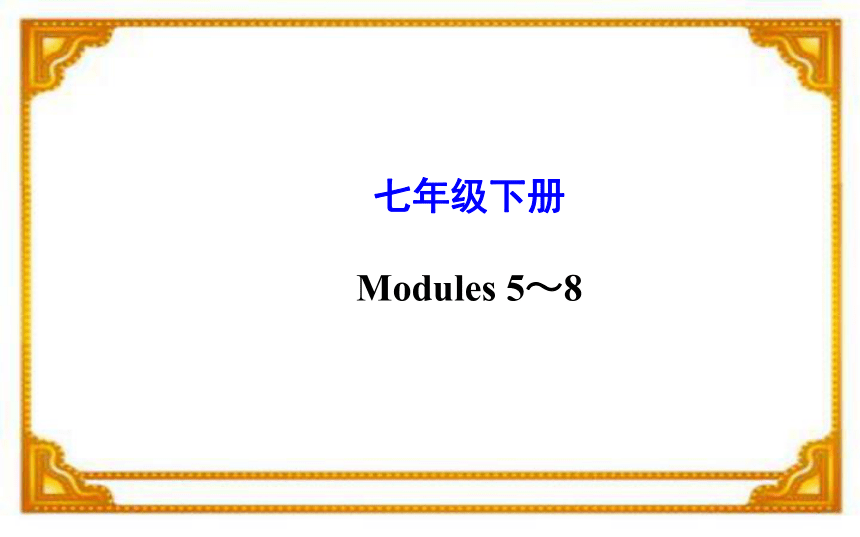
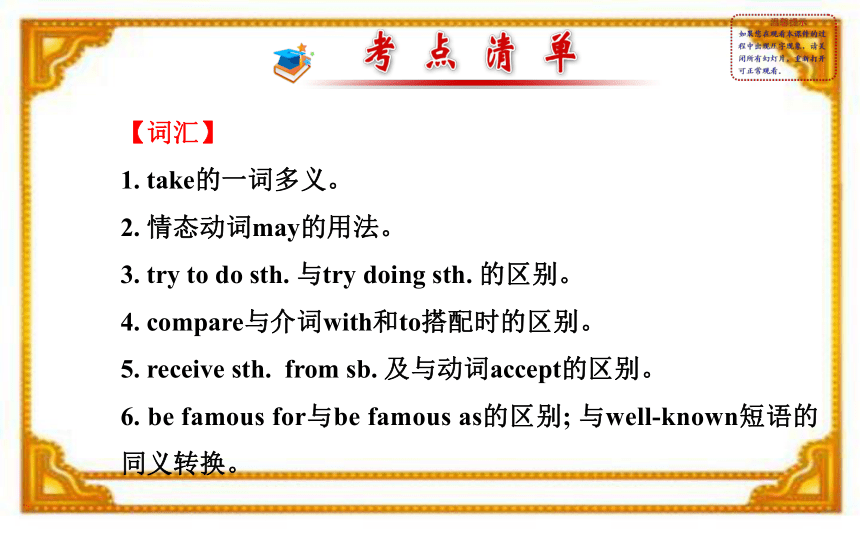
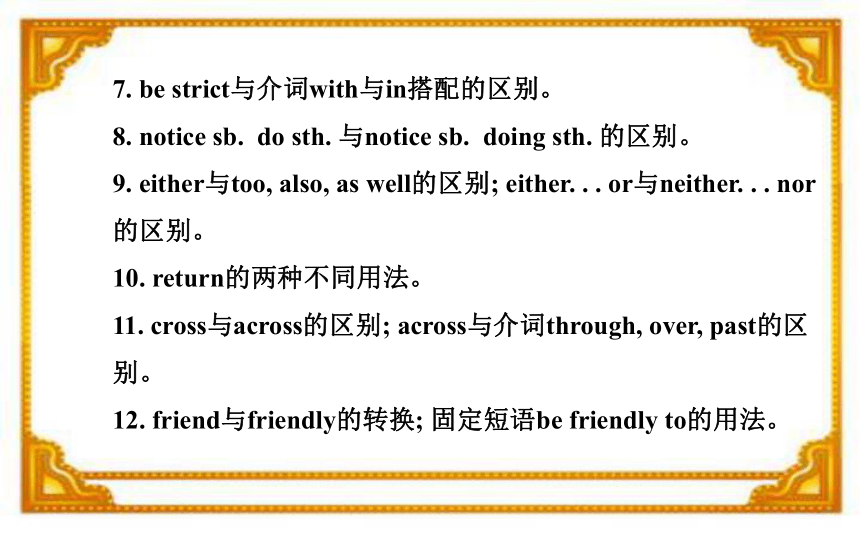
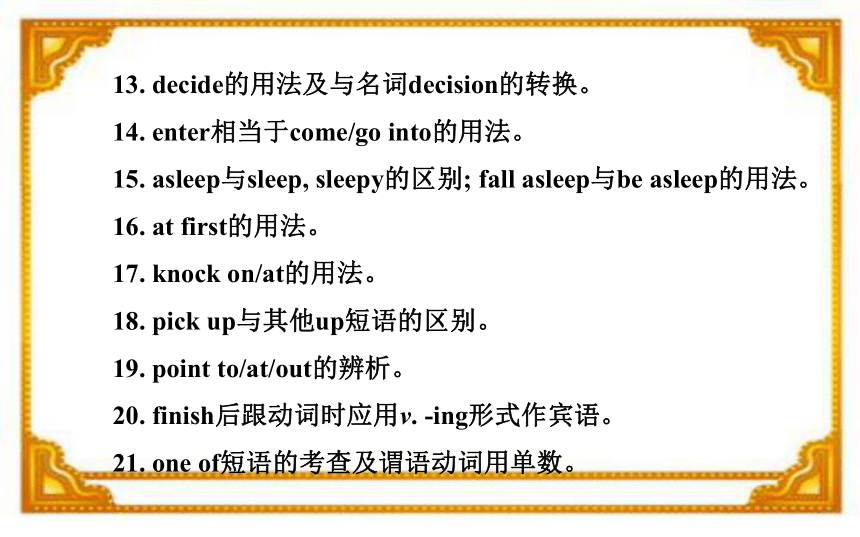
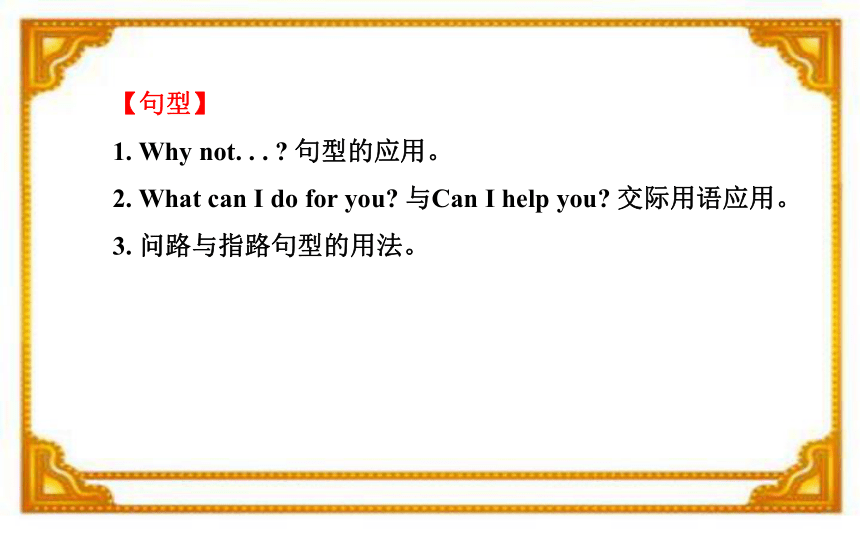
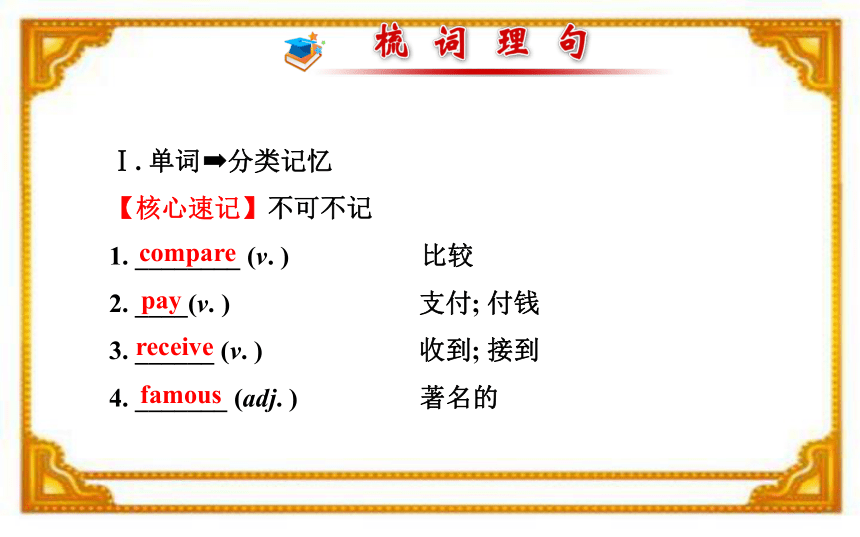
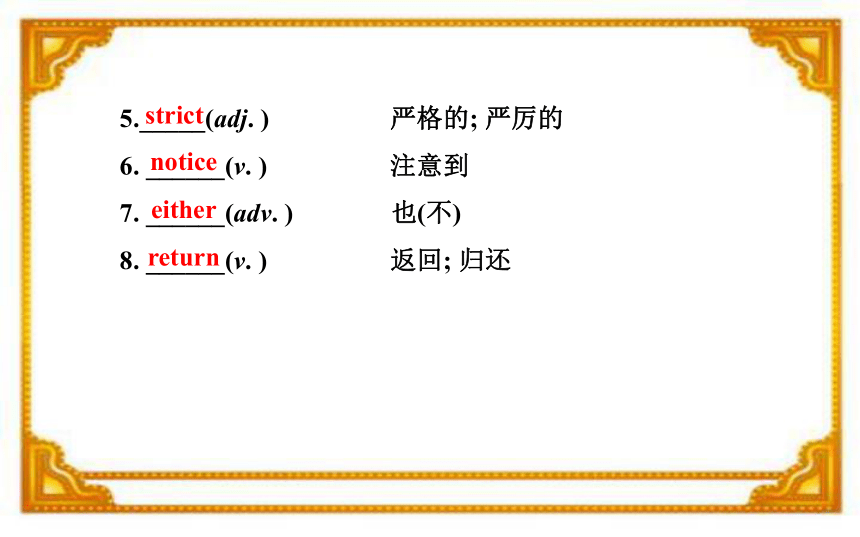
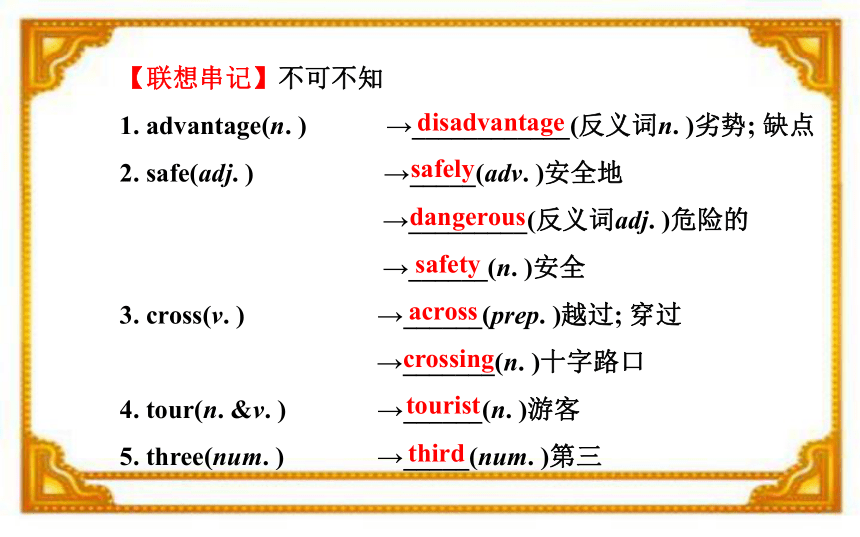
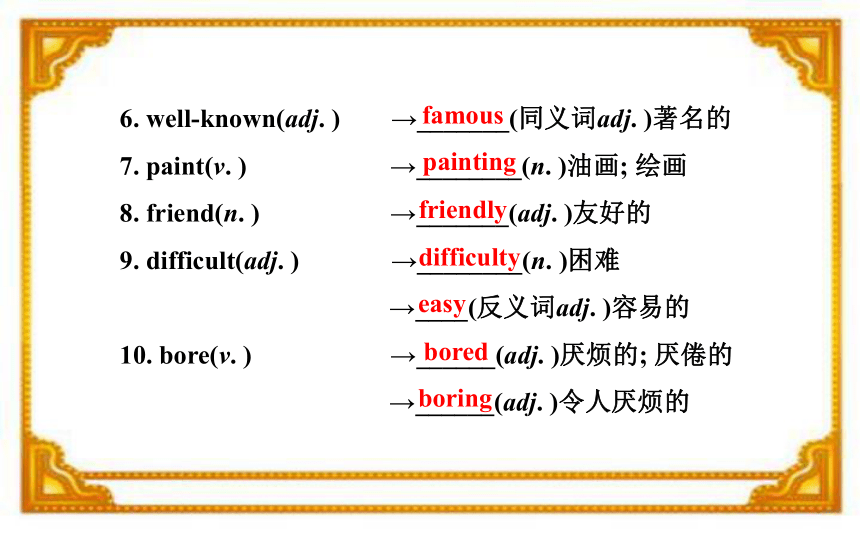
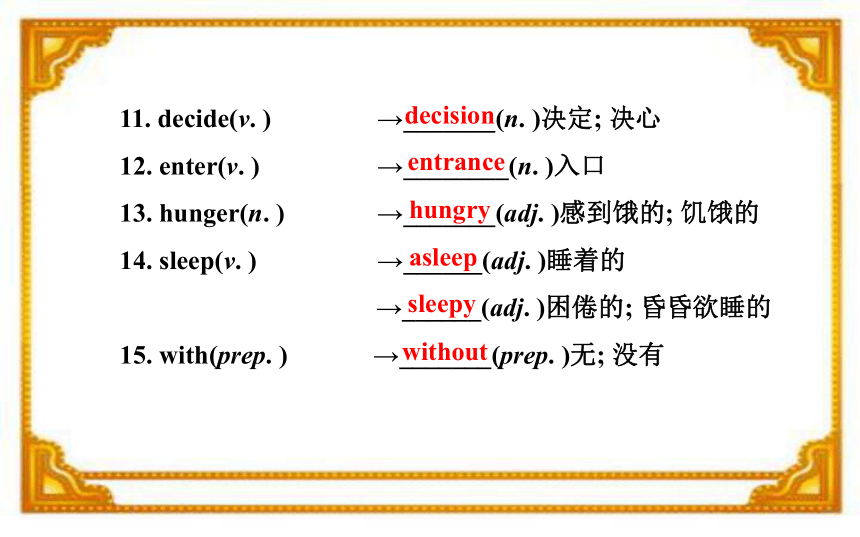
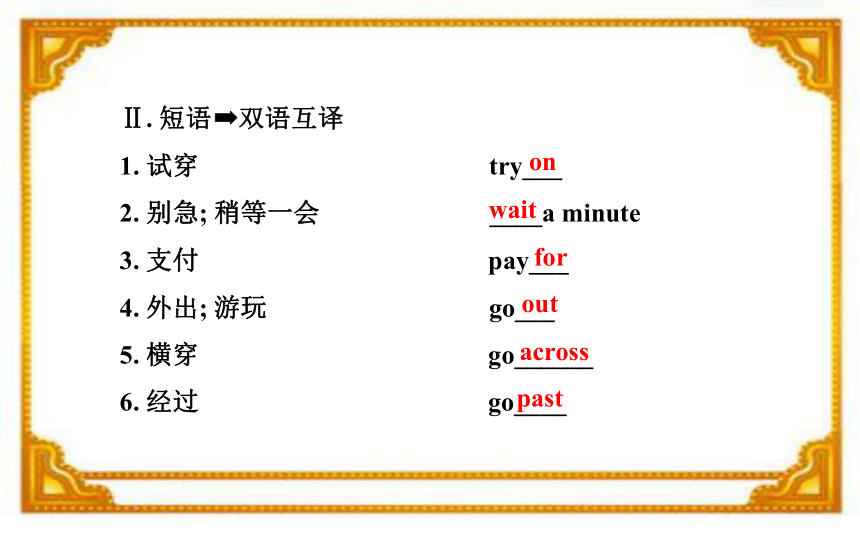
文档简介
课件68张PPT。2015年中考外研版英语一轮教材复习课件七年级下册
Modules 5~8【词汇】
1. take的一词多义。
2. 情态动词may的用法。
3. try to do sth. 与try doing sth. 的区别。
4. compare与介词with和to搭配时的区别。
5. receive sth. from sb. 及与动词accept的区别。
6. be famous for与be famous as的区别; 与well-known短语的同义转换。7. be strict与介词with与in搭配的区别。
8. notice sb. do sth. 与notice sb. doing sth. 的区别。
9. either与too, also, as well的区别; either. . . or与neither. . . nor的区别。
10. return的两种不同用法。
11. cross与across的区别; across与介词through, over, past的区别。
12. friend与friendly的转换; 固定短语be friendly to的用法。13. decide的用法及与名词decision的转换。
14. enter相当于come/go into的用法。
15. asleep与sleep, sleepy的区别; fall asleep与be asleep的用法。
16. at first的用法。
17. knock on/at的用法。
18. pick up与其他up短语的区别。
19. point to/at/out的辨析。
20. finish后跟动词时应用v. -ing形式作宾语。
21. one of短语的考查及谓语动词用单数。【句型】
1. Why not. . . ? 句型的应用。
2. What can I do for you? 与Can I help you? 交际用语应用。
3. 问路与指路句型的用法。Ⅰ. 单词?分类记忆
【核心速记】不可不记
1. ________ (v. ) 比较
2. ____(v. ) 支付; 付钱
3. ______ (v. ) 收到; 接到
4. _______ (adj. ) 著名的comparepayreceivefamous5._____(adj. ) 严格的; 严厉的
6. ______(v. ) 注意到
7. ______(adv. ) 也(不)
8. ______(v. ) 返回; 归还 strictnoticeeitherreturn【联想串记】不可不知
1. advantage(n. ) →____________(反义词n. )劣势; 缺点
2. safe(adj. ) →_____(adv. )安全地
→_________(反义词adj. )危险的
→______(n. )安全
3. cross(v. ) →______(prep. )越过; 穿过
→_______(n. )十字路口
4. tour(n. &v. ) →______(n. )游客
5. three(num. ) →_____(num. )第三disadvantagesafelydangeroussafetyacrosscrossingtouristthird6. well-known(adj. ) →_______(同义词adj. )著名的
7. paint(v. ) →________(n. )油画; 绘画
8. friend(n. ) →_______(adj. )友好的
9. difficult(adj. ) →________(n. )困难
→____(反义词adj. )容易的
10. bore(v. ) →______(adj. )厌烦的; 厌倦的
→______(adj. )令人厌烦的famouspaintingfriendlydifficultyeasyboredboring11. decide(v. ) →_______(n. )决定; 决心
12. enter(v. ) →________(n. )入口
13. hunger(n. ) →_______(adj. )感到饿的; 饥饿的
14. sleep(v. ) →______(adj. )睡着的
→______(adj. )困倦的; 昏昏欲睡的
15. with(prep. ) →_______(prep. )无; 没有decisionentrancehungryasleepsleepywithoutⅡ. 短语?双语互译
1. 试穿 try___
2. 别急; 稍等一会 ____a minute
3. 支付 pay___
4. 外出; 游玩 go___
5. 横穿 go______
6. 经过 go____on waitforoutacrosspast7. 散步 go___a_____
8. 敲门 knock_____
9. 拿起; 举起 pick___
10. 起初; 首先 __first
11. 指着…… point__
12. half price _____
13. once upon a time _____
14. look around _________forwalkon/atupatat半价从前环视四周Ⅲ. 句型?超级填写
1. ——你想买点什么?
—____________________?
——我想为妈妈买件T恤。
—______________a T-shirt for my mum.
2. ——你能告诉我去王府井大街的路吗?
—_______________________ Wangfujing Dajie?
——横穿……, 沿着……走, 在左边第三条街向左拐。
—_________. . . , ________. . . and________ at the third
street on the left. What can I do for you?I’d like to buyCan you tell me the way toGo acrossgo alongturn left3. 你能告诉我怎么到达国家体育馆吗?
___________________________the National Stadium?
4. ——你出生在哪儿?
—Where _____________? ?
——我出生在山西省的一个小村子里。
—I ________in a small village in Shanxi Province.
5. 她经常独自一人在森林里散步吗?
______________for a walk in the forest alone? Could you tell me how to get towere you bornwas bornDid she often go【核心词汇】
1. may v. aux. 可以; 可能
【填一填 思维激活】
①我用一下你的电脑可以吗?
_______ I _______ your computer?
②你可能是对的。
You _______ _______ right.
答案: ①May; use ②may be ③—May I have a look at your new photo?
—Sorry, you . (may not/can not)
答案: can not 【记一记 知识构建】
may的不同用法
(1)表示许可或征求对方的许可, 意为“可以”。
(2)表示猜测, 通常只用于陈述句, 意为“可能”。
(3)回答以may开头的疑问句时, 肯定回答用may, 否定回答用can或must。
(4)表示祝愿, 意思为“祝……, 但愿……”。【练一练 走近中考】
(2014·威海中考)—Bob, where is Linda?
—She be in the library, but I am not sure.
A. must B. may
C. need D. has to2. try v. 尝试; 试穿; 品尝
【填一填 思维激活】
①我喜欢这条裙子, 我能试穿一下吗?
I like the skirt. May I _______ _______ _______?
②Let’s try _______ (knock) at the back door.
③I’ll try _______ (finish) the job as soon as possible.
答案: ①try it on ②knocking ③to finish【看一看 图解考点】【温馨提示】
除了try以外, remember, forget, continue, stop, go on用法与try类似, 后面既可接动词不定式作宾语, 也可接动名词作宾语, 但两种结构的意义不同。【练一练 走近中考】
①(2014·广安中考)—This yellow T-shirt looks nice. May I ?
—Sure.
A. try them on B. try on it C. try it on
②(2013·盐城中考)让我们尽最大的努力来帮助贫困地区的孩子们。
Let’s the children in poor areas.
答案: do/try our best to help3. across prep. 越过
【填一填 思维激活】
选词填空across/through/over。
①Go Dong Chang’an Jie.
②The river runs the city.
③The thief wanted to run the wall, but he was still caught by the policemen.
答案: ①across ②through ③over【看一看 图解考点】【练一练 走近中考】
①(2013·扬州中考)We can’t walk the street when the traffic light is red. (cross)
答案: across ②(2013·内江中考)The old man is a good swimmer, and even now he often swims Tuojiang River after supper.
A. over B. through
C. to D. across4. either adv. 也(不)
【填一填 思维激活】
①这把中号的椅子也不舒服。
The middle chair was comfortable .
②两条路你随便走哪一条。
You can take the roads.
③Either you or Jim (have) a chance to visit the museum.
答案: ①not; either ②either of ③has【记一记 知识构建】
either的不同词性及用法【练一练 走近中考】
①(2014·安徽中考)You can take of the two toy cars and leave the other for your brother.
A. both B. none C. either D. neither
②(2014·呼和浩特中考)—Where are you going to stay when you get to Shanghai?
—I may live in a hotel in a friend’s house.
A. both; and B. either; or
C. neither; nor D. not only; but also5. asleep adj. 睡着的
【填一填 思维激活】选词填空sleep/asleep/sleeping/sleepy。
①Very soon she was in the little bed.
②The boy felt very in the day because he didn’t
well the night before.
答案: ①asleep ②sleepy; sleep【记一记 知识构建】【图解助记】【练一练 走近中考】
①(2013·丽水中考)Take some rest after lunch and you won’t feel in the afternoon. (lucky/sleepy)
答案: sleepy②(2013·青岛中考)The astronaut is so tired that he for eleven hours.
A. has been asleep B. has fallen asleep
C. has gone to bed D. has gone to sleep6. pick up拿起; 举起
【填一填 思维激活】
①她拿起那个大碗, 但是她不喜欢它。
She _______ _______ the big bowl but she didn’t like it.
②地上有张纸, 你能把它捡起来吗?
There is a piece of paper on the floor. Would you please _______ _______ _______?
③到宾馆接我吧。
_______ _______ _______ at the hotel.
答案: ①picked up ②pick it up ③Pick me up【记一记 知识构建】
(1)pick up“拿起; 举起”是由动词加副词构成的动词短语。当代词作宾语时, 需要放在动词与副词之间; 若名词作宾语, 既可以放在二者之间, 也可以放在动词短语之后。
(2)pick up的一词多义【一言辨异】He picked up a wallet on the way to picking up his daughter. 他在接他女儿的路上捡到一个钱包。【练一练 走近中考】
①(2013·武汉中考)It seems that the aged people the H7N9 more easily from the recent cases.
A. pick up B. mix up
C. set up D. use up
②(2014·绍兴中考)—Do you your son after school?
—No, he comes back home on the school bus.
A. pick up B. look after
C. drop in D. send for【重点句型】
1. What can I do for you? 我能为你做点什么?
Can I help you? 你需要帮忙吗? 【思一思 句型剖析】
(1)What can I do for you? 相当于Can I help you? 是情景交际用语, 谈话地点多为餐馆、商店及图书馆等场所, 通常用于服务员主动询问顾客是否需要帮助。
(2)回答时, 常用“I’d like some. . . / I’d like to buy. . . / I want to buy. . . ”等句子作答。【练一练 走近中考】
(2014·南昌中考)—Good morning, sir! ?
—I’d like to buy a sweater for my daughter.
A. What can I do for you
B. What are you doing
C. How about the sweater
D. Can you help me2. Can you tell me the way to Wangfujing Dajie?
你能告诉我去王府井大街的路吗?
【思一思 句型剖析】
(1)常见的问路句型:
①Could you please tell me where. . . is?
②Could you please tell me how to get to. . . ?
③Could you please tell me how I can get to. . . ? ④Where is. . . , please?
⑤Could you please tell me the way to. . . ?
⑥Which is the way to. . . ?
⑦Is there. . . near here? (2)常用的指路句型:
①It’s +介词短语(地点)它在……。
②It’s about . . . meters from here.
它离这儿大约有……米。
③It’s about . . . meters along on the left/right.
向前走, 在左/右侧大约……米。④Walk on and turn left/right.
向前走, 然后向左/右拐。
⑤Turn left/right at the first crossing.
=Take the first crossing on the left/right.
在第一个路口向左/右拐。
⑥You can take the No. 7 bus.
你可以乘坐7路公交车。【练一练 走近中考】
(2014·南昌中考)—Excuse me, could you tell me ?
—Go along this street until you see some buildings with golden roofs.
A. how I can go to Tianning Temple(天宁寺)
B. how often you go to Tianning Temple
C. how soon you will go to Tianning Temple
D. how many times you have been to Tianning Temple【要点备选】
1. return v. 返回; 归还
【填一填 思维激活】
①别忘了把钢笔还给我。
Don’t forget to _______ the pen _______ me.
②她明天要返回澳大利亚了。
She’ll _______ _______ Australia tomorrow.
③I have returned the book to the library. (改为同义句)
I have _______ _______ the book to the library.
答案: ①return; to ②return to ③given back【记一记 知识构建】
(1)return相当于give back, 意为“归还”, 常用于return sth. to sb. 结构。
(2)return还可表示“回来”, 相当于come/get back, 意为“返回”, 常用于return to someplace结构。【练一练 走近中考】
(2014·台州中考)—Where are you going?
—To the library. I’ve finished reading this book, so I’m going to it.
A. buy B. throw
C. return D. borrow2. take v. 穿(某尺寸的衣服或鞋子)
【填一填 思维激活】
①——她穿什么尺寸的? ——小号。
—What size does she ? —Small.
②你可以乘公共汽车或出租车去那儿。
You can a bus or a taxi there.
③我就买这件T恤。
I will this T-shirt.
答案: ①take ②take ③take 【看一看 图解考点】take的一词多义【练一练 走近中考】
(2013·荆门中考)It usually Mum about half an hour to cook supper.
A. pays B. takes C. spends D. costs3. compare v. 比较
【填一填 思维激活】
①我们可以比较相同产品的价格。
We can _______ the prices of the same product.
②人们常常把孩子们比作花朵。
People usually _______ children _______ flowers.
③和美国比起来, 中国的人口更多。
_______ _______ America, the population of China is larger.
答案: ①compare ②compare; to ③Compared to/with【记一记 知识构建】
(1)compare. . . with/to. . . “把……和……进行比较”, 两个介词都可以用, 两者需为同类事物;
(2)compare. . . to. . . “把……比作……”, 只能用to, 两者需为不同类事物。【图解助记】【练一练 走近中考】
(2013·兰州中考)When we (比较)western culture with Chinese culture, you’ll find many differences.
答案: compare4. decide v. 决定
【填一填 思维激活】
①她决定拿着篮子去公园散步。
She _______ _______ _______ for a walk in the park with her basket.
②如果我是一名老师, 我将允许我的学生自己做决定。
If I were a teacher, I would allow my students to _______ _______ by themselves.
答案: ①decided to go ②make decisions ③——女士, 你最喜欢哪条裙子?
——对不起, 我还没决定要买哪一条。
—Which dress do you like best, Madam?
—Sorry, I can’t decide _______ _______ _______ _______ now.
答案: which one to buy【记一记 知识构建】
(1)decide作动词, 常用于以下结构:
①跟动词不定式decide+(not)to do决定(不)做某事;
②跟从句decide+that/which/when/how等;
③跟疑问词与动词不定式的复合结构decide+what/which/when/how+to do
④跟介词短语decide+on/upon+sth. /doing sth.
⑤跟名词、代词decide+n. /pron.
(2)decide的名词为decision。常构成短语: make a decision/decisions意为“做决定”。【练一练 走近中考】
(2014·上海中考)Harry has decided an online shop after graduating from school.
A. open B. to open
C. opened D. opening5. notice v. 注意到
【填一填 思维激活】
①你有没有注意到他的手在抖?
Did you his hand ?
②Did you notice Tony (come/came) into the room?
③He was noticed (leave) the house an hour ago.
④办公室门口贴着一张“禁止停车”的告示。
There is a on the office gate saying “No Parking”.
答案: ①notice; shaking ②come ③to leave ④notice 【辨一辨 考点突破】【练一练 走近中考】
(2012·宁波中考)—Do you that Nancy has been a little too quiet these days?
—Yes. She didn’t even say a word this afternoon.
A. hope B. notice C. explain D. decide6. point v. 指向; 指
【填一填 思维激活】
①然后小熊指着他床上的小女孩。
Then Baby Bear the little girl in his bed.
②He pointed (at/to) the mountains far away.
答案: ①pointed at ②to③我的数学老师经常指出我的错误。
My maths teacher often my mistakes.
④我们赢了5分。
We won by 5 .
答案: ③points out ④points【记一记 知识构建】
point的两种词性
(1)v. 指向; 指
(2)n. 小数点; 得分【练一练 走近中考】
(2013·黄冈中考)In China, we shouldn’t (指向)at anyone with our chopsticks.
答案: point
Modules 5~8【词汇】
1. take的一词多义。
2. 情态动词may的用法。
3. try to do sth. 与try doing sth. 的区别。
4. compare与介词with和to搭配时的区别。
5. receive sth. from sb. 及与动词accept的区别。
6. be famous for与be famous as的区别; 与well-known短语的同义转换。7. be strict与介词with与in搭配的区别。
8. notice sb. do sth. 与notice sb. doing sth. 的区别。
9. either与too, also, as well的区别; either. . . or与neither. . . nor的区别。
10. return的两种不同用法。
11. cross与across的区别; across与介词through, over, past的区别。
12. friend与friendly的转换; 固定短语be friendly to的用法。13. decide的用法及与名词decision的转换。
14. enter相当于come/go into的用法。
15. asleep与sleep, sleepy的区别; fall asleep与be asleep的用法。
16. at first的用法。
17. knock on/at的用法。
18. pick up与其他up短语的区别。
19. point to/at/out的辨析。
20. finish后跟动词时应用v. -ing形式作宾语。
21. one of短语的考查及谓语动词用单数。【句型】
1. Why not. . . ? 句型的应用。
2. What can I do for you? 与Can I help you? 交际用语应用。
3. 问路与指路句型的用法。Ⅰ. 单词?分类记忆
【核心速记】不可不记
1. ________ (v. ) 比较
2. ____(v. ) 支付; 付钱
3. ______ (v. ) 收到; 接到
4. _______ (adj. ) 著名的comparepayreceivefamous5._____(adj. ) 严格的; 严厉的
6. ______(v. ) 注意到
7. ______(adv. ) 也(不)
8. ______(v. ) 返回; 归还 strictnoticeeitherreturn【联想串记】不可不知
1. advantage(n. ) →____________(反义词n. )劣势; 缺点
2. safe(adj. ) →_____(adv. )安全地
→_________(反义词adj. )危险的
→______(n. )安全
3. cross(v. ) →______(prep. )越过; 穿过
→_______(n. )十字路口
4. tour(n. &v. ) →______(n. )游客
5. three(num. ) →_____(num. )第三disadvantagesafelydangeroussafetyacrosscrossingtouristthird6. well-known(adj. ) →_______(同义词adj. )著名的
7. paint(v. ) →________(n. )油画; 绘画
8. friend(n. ) →_______(adj. )友好的
9. difficult(adj. ) →________(n. )困难
→____(反义词adj. )容易的
10. bore(v. ) →______(adj. )厌烦的; 厌倦的
→______(adj. )令人厌烦的famouspaintingfriendlydifficultyeasyboredboring11. decide(v. ) →_______(n. )决定; 决心
12. enter(v. ) →________(n. )入口
13. hunger(n. ) →_______(adj. )感到饿的; 饥饿的
14. sleep(v. ) →______(adj. )睡着的
→______(adj. )困倦的; 昏昏欲睡的
15. with(prep. ) →_______(prep. )无; 没有decisionentrancehungryasleepsleepywithoutⅡ. 短语?双语互译
1. 试穿 try___
2. 别急; 稍等一会 ____a minute
3. 支付 pay___
4. 外出; 游玩 go___
5. 横穿 go______
6. 经过 go____on waitforoutacrosspast7. 散步 go___a_____
8. 敲门 knock_____
9. 拿起; 举起 pick___
10. 起初; 首先 __first
11. 指着…… point__
12. half price _____
13. once upon a time _____
14. look around _________forwalkon/atupatat半价从前环视四周Ⅲ. 句型?超级填写
1. ——你想买点什么?
—____________________?
——我想为妈妈买件T恤。
—______________a T-shirt for my mum.
2. ——你能告诉我去王府井大街的路吗?
—_______________________ Wangfujing Dajie?
——横穿……, 沿着……走, 在左边第三条街向左拐。
—_________. . . , ________. . . and________ at the third
street on the left. What can I do for you?I’d like to buyCan you tell me the way toGo acrossgo alongturn left3. 你能告诉我怎么到达国家体育馆吗?
___________________________the National Stadium?
4. ——你出生在哪儿?
—Where _____________? ?
——我出生在山西省的一个小村子里。
—I ________in a small village in Shanxi Province.
5. 她经常独自一人在森林里散步吗?
______________for a walk in the forest alone? Could you tell me how to get towere you bornwas bornDid she often go【核心词汇】
1. may v. aux. 可以; 可能
【填一填 思维激活】
①我用一下你的电脑可以吗?
_______ I _______ your computer?
②你可能是对的。
You _______ _______ right.
答案: ①May; use ②may be ③—May I have a look at your new photo?
—Sorry, you . (may not/can not)
答案: can not 【记一记 知识构建】
may的不同用法
(1)表示许可或征求对方的许可, 意为“可以”。
(2)表示猜测, 通常只用于陈述句, 意为“可能”。
(3)回答以may开头的疑问句时, 肯定回答用may, 否定回答用can或must。
(4)表示祝愿, 意思为“祝……, 但愿……”。【练一练 走近中考】
(2014·威海中考)—Bob, where is Linda?
—She be in the library, but I am not sure.
A. must B. may
C. need D. has to2. try v. 尝试; 试穿; 品尝
【填一填 思维激活】
①我喜欢这条裙子, 我能试穿一下吗?
I like the skirt. May I _______ _______ _______?
②Let’s try _______ (knock) at the back door.
③I’ll try _______ (finish) the job as soon as possible.
答案: ①try it on ②knocking ③to finish【看一看 图解考点】【温馨提示】
除了try以外, remember, forget, continue, stop, go on用法与try类似, 后面既可接动词不定式作宾语, 也可接动名词作宾语, 但两种结构的意义不同。【练一练 走近中考】
①(2014·广安中考)—This yellow T-shirt looks nice. May I ?
—Sure.
A. try them on B. try on it C. try it on
②(2013·盐城中考)让我们尽最大的努力来帮助贫困地区的孩子们。
Let’s the children in poor areas.
答案: do/try our best to help3. across prep. 越过
【填一填 思维激活】
选词填空across/through/over。
①Go Dong Chang’an Jie.
②The river runs the city.
③The thief wanted to run the wall, but he was still caught by the policemen.
答案: ①across ②through ③over【看一看 图解考点】【练一练 走近中考】
①(2013·扬州中考)We can’t walk the street when the traffic light is red. (cross)
答案: across ②(2013·内江中考)The old man is a good swimmer, and even now he often swims Tuojiang River after supper.
A. over B. through
C. to D. across4. either adv. 也(不)
【填一填 思维激活】
①这把中号的椅子也不舒服。
The middle chair was comfortable .
②两条路你随便走哪一条。
You can take the roads.
③Either you or Jim (have) a chance to visit the museum.
答案: ①not; either ②either of ③has【记一记 知识构建】
either的不同词性及用法【练一练 走近中考】
①(2014·安徽中考)You can take of the two toy cars and leave the other for your brother.
A. both B. none C. either D. neither
②(2014·呼和浩特中考)—Where are you going to stay when you get to Shanghai?
—I may live in a hotel in a friend’s house.
A. both; and B. either; or
C. neither; nor D. not only; but also5. asleep adj. 睡着的
【填一填 思维激活】选词填空sleep/asleep/sleeping/sleepy。
①Very soon she was in the little bed.
②The boy felt very in the day because he didn’t
well the night before.
答案: ①asleep ②sleepy; sleep【记一记 知识构建】【图解助记】【练一练 走近中考】
①(2013·丽水中考)Take some rest after lunch and you won’t feel in the afternoon. (lucky/sleepy)
答案: sleepy②(2013·青岛中考)The astronaut is so tired that he for eleven hours.
A. has been asleep B. has fallen asleep
C. has gone to bed D. has gone to sleep6. pick up拿起; 举起
【填一填 思维激活】
①她拿起那个大碗, 但是她不喜欢它。
She _______ _______ the big bowl but she didn’t like it.
②地上有张纸, 你能把它捡起来吗?
There is a piece of paper on the floor. Would you please _______ _______ _______?
③到宾馆接我吧。
_______ _______ _______ at the hotel.
答案: ①picked up ②pick it up ③Pick me up【记一记 知识构建】
(1)pick up“拿起; 举起”是由动词加副词构成的动词短语。当代词作宾语时, 需要放在动词与副词之间; 若名词作宾语, 既可以放在二者之间, 也可以放在动词短语之后。
(2)pick up的一词多义【一言辨异】He picked up a wallet on the way to picking up his daughter. 他在接他女儿的路上捡到一个钱包。【练一练 走近中考】
①(2013·武汉中考)It seems that the aged people the H7N9 more easily from the recent cases.
A. pick up B. mix up
C. set up D. use up
②(2014·绍兴中考)—Do you your son after school?
—No, he comes back home on the school bus.
A. pick up B. look after
C. drop in D. send for【重点句型】
1. What can I do for you? 我能为你做点什么?
Can I help you? 你需要帮忙吗? 【思一思 句型剖析】
(1)What can I do for you? 相当于Can I help you? 是情景交际用语, 谈话地点多为餐馆、商店及图书馆等场所, 通常用于服务员主动询问顾客是否需要帮助。
(2)回答时, 常用“I’d like some. . . / I’d like to buy. . . / I want to buy. . . ”等句子作答。【练一练 走近中考】
(2014·南昌中考)—Good morning, sir! ?
—I’d like to buy a sweater for my daughter.
A. What can I do for you
B. What are you doing
C. How about the sweater
D. Can you help me2. Can you tell me the way to Wangfujing Dajie?
你能告诉我去王府井大街的路吗?
【思一思 句型剖析】
(1)常见的问路句型:
①Could you please tell me where. . . is?
②Could you please tell me how to get to. . . ?
③Could you please tell me how I can get to. . . ? ④Where is. . . , please?
⑤Could you please tell me the way to. . . ?
⑥Which is the way to. . . ?
⑦Is there. . . near here? (2)常用的指路句型:
①It’s +介词短语(地点)它在……。
②It’s about . . . meters from here.
它离这儿大约有……米。
③It’s about . . . meters along on the left/right.
向前走, 在左/右侧大约……米。④Walk on and turn left/right.
向前走, 然后向左/右拐。
⑤Turn left/right at the first crossing.
=Take the first crossing on the left/right.
在第一个路口向左/右拐。
⑥You can take the No. 7 bus.
你可以乘坐7路公交车。【练一练 走近中考】
(2014·南昌中考)—Excuse me, could you tell me ?
—Go along this street until you see some buildings with golden roofs.
A. how I can go to Tianning Temple(天宁寺)
B. how often you go to Tianning Temple
C. how soon you will go to Tianning Temple
D. how many times you have been to Tianning Temple【要点备选】
1. return v. 返回; 归还
【填一填 思维激活】
①别忘了把钢笔还给我。
Don’t forget to _______ the pen _______ me.
②她明天要返回澳大利亚了。
She’ll _______ _______ Australia tomorrow.
③I have returned the book to the library. (改为同义句)
I have _______ _______ the book to the library.
答案: ①return; to ②return to ③given back【记一记 知识构建】
(1)return相当于give back, 意为“归还”, 常用于return sth. to sb. 结构。
(2)return还可表示“回来”, 相当于come/get back, 意为“返回”, 常用于return to someplace结构。【练一练 走近中考】
(2014·台州中考)—Where are you going?
—To the library. I’ve finished reading this book, so I’m going to it.
A. buy B. throw
C. return D. borrow2. take v. 穿(某尺寸的衣服或鞋子)
【填一填 思维激活】
①——她穿什么尺寸的? ——小号。
—What size does she ? —Small.
②你可以乘公共汽车或出租车去那儿。
You can a bus or a taxi there.
③我就买这件T恤。
I will this T-shirt.
答案: ①take ②take ③take 【看一看 图解考点】take的一词多义【练一练 走近中考】
(2013·荆门中考)It usually Mum about half an hour to cook supper.
A. pays B. takes C. spends D. costs3. compare v. 比较
【填一填 思维激活】
①我们可以比较相同产品的价格。
We can _______ the prices of the same product.
②人们常常把孩子们比作花朵。
People usually _______ children _______ flowers.
③和美国比起来, 中国的人口更多。
_______ _______ America, the population of China is larger.
答案: ①compare ②compare; to ③Compared to/with【记一记 知识构建】
(1)compare. . . with/to. . . “把……和……进行比较”, 两个介词都可以用, 两者需为同类事物;
(2)compare. . . to. . . “把……比作……”, 只能用to, 两者需为不同类事物。【图解助记】【练一练 走近中考】
(2013·兰州中考)When we (比较)western culture with Chinese culture, you’ll find many differences.
答案: compare4. decide v. 决定
【填一填 思维激活】
①她决定拿着篮子去公园散步。
She _______ _______ _______ for a walk in the park with her basket.
②如果我是一名老师, 我将允许我的学生自己做决定。
If I were a teacher, I would allow my students to _______ _______ by themselves.
答案: ①decided to go ②make decisions ③——女士, 你最喜欢哪条裙子?
——对不起, 我还没决定要买哪一条。
—Which dress do you like best, Madam?
—Sorry, I can’t decide _______ _______ _______ _______ now.
答案: which one to buy【记一记 知识构建】
(1)decide作动词, 常用于以下结构:
①跟动词不定式decide+(not)to do决定(不)做某事;
②跟从句decide+that/which/when/how等;
③跟疑问词与动词不定式的复合结构decide+what/which/when/how+to do
④跟介词短语decide+on/upon+sth. /doing sth.
⑤跟名词、代词decide+n. /pron.
(2)decide的名词为decision。常构成短语: make a decision/decisions意为“做决定”。【练一练 走近中考】
(2014·上海中考)Harry has decided an online shop after graduating from school.
A. open B. to open
C. opened D. opening5. notice v. 注意到
【填一填 思维激活】
①你有没有注意到他的手在抖?
Did you his hand ?
②Did you notice Tony (come/came) into the room?
③He was noticed (leave) the house an hour ago.
④办公室门口贴着一张“禁止停车”的告示。
There is a on the office gate saying “No Parking”.
答案: ①notice; shaking ②come ③to leave ④notice 【辨一辨 考点突破】【练一练 走近中考】
(2012·宁波中考)—Do you that Nancy has been a little too quiet these days?
—Yes. She didn’t even say a word this afternoon.
A. hope B. notice C. explain D. decide6. point v. 指向; 指
【填一填 思维激活】
①然后小熊指着他床上的小女孩。
Then Baby Bear the little girl in his bed.
②He pointed (at/to) the mountains far away.
答案: ①pointed at ②to③我的数学老师经常指出我的错误。
My maths teacher often my mistakes.
④我们赢了5分。
We won by 5 .
答案: ③points out ④points【记一记 知识构建】
point的两种词性
(1)v. 指向; 指
(2)n. 小数点; 得分【练一练 走近中考】
(2013·黄冈中考)In China, we shouldn’t (指向)at anyone with our chopsticks.
答案: point
